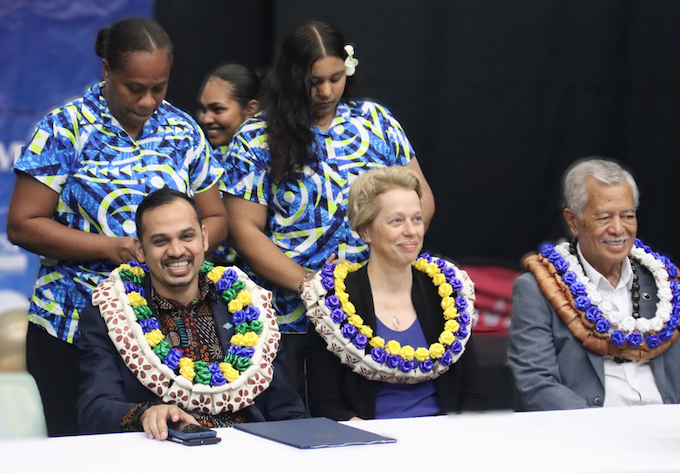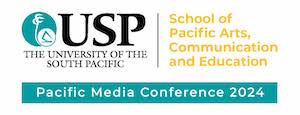
By Kamna Kumar in Suva
Pacific Islands Forum Secretary-General Henry Puna stressed the importance of media freedom and its link to the climate and environmental crisis at the 2024 World Press Freedom Day event organised by the University of the South Pacific’s journalism programme.
Under the theme “A Planet for the Press: Journalism in the face of the environment crisis”, Puna underscored the critical role of a free press in addressing the challenges of climate change.
“The challenges confronting the climate crisis and the news profession seem to share a common urgency,” Puna said at the event last Friday.
- READ MORE: Other Pacific climate crisis journalism reports
- SG Puna’s full speech at the USP WPFD event, May 3, 2024

He highlighted the shared urgency between climate activism and the news profession, noting how both were often perceived as disruptors in contemporary narratives.
Puna drew attention to the alarming death toll of journalists, particularly in conflict zones like Gaza, and the pervasive threats faced by journalists worldwide, including in the Pacific region.
Against this backdrop, he emphasised the vital importance of truth and facts in combating misinformation and disinformation, which pose significant obstacles to addressing climate change effectively.

The Secretary-General’s address resonated with a sense of urgency, emphasising the need for journalism that informs, educates, and amplifies diverse voices, especially those from vulnerable nations directly impacted by the climate crisis.
‘Frontlines of climate change’
He said the imperative for a press that reported from the “frontlines of climate change”, advocating for a 1.5-degree Celsius, net-zero future as the paramount goal for survival.
“A press for the planet is a press that informs and educates,” Puna said.
“And, of course, for our Blue Continent, it must be a press of inclusive and diverse voices.”
Puna highlighted the Pacific Islands Forum’s commitment to transparency and accountability, noting the crucial role of media in communicating the outcomes and decisions of annual meetings.
He cited instances where the presence of journalists enhanced the Forum’s advocacy efforts on climate, environment, and ocean priorities on the global stage.
Reflecting on past collaborative efforts, such as the launch of the Teieniwa Vision against corruption, Puna underscored the symbiotic relationship between political will and journalistic integrity.
He urged governments and media watchdogs to work hand in hand in upholding shared values of transparency, courage, and ethics.

‘Political will’ needed
“It takes political will to enforce the criminalisation of corruption and prompt, impartial investigation, and prosecution,” Puna said.
Looking ahead to 2050, he expressed hope for a resilient Blue Pacific continent, built on the foundations of a robust and resilient press.
He envisioned a future where stories of climate crisis give way to narratives of peace and prosperity, contingent upon achieving the 1.5-degree Celsius, net-zero target.
“In 2050, we will have achieved the 1.5 net zero future that will ensure our stories of the code red for climate in 2024 become the stories of a code blue for peace and prosperity beyond 2050,” Puna said.
Media’s crucial role in ClimateChange & environment reporting was the focus of @UniSouthPacific JournalismProgram #WPFD event. EU Pacific Ambassador Plinkert, PIFs GS Puna & Fiji Environment Ministry PS Dr Michael delivered powerful addresses followed by panel discussion. pic.twitter.com/fle6h02Oe2
— Dr Shailendra B Singh (@ShailendraBSing) May 6, 2024
He commended the commitments made at the G7 Ministerial in Turin to limit global warming to 1.5 degrees Celsius, emphasising the pivotal role of media in upholding democratic values and advancing collective aspirations for a secure and free society.
Puna extended his best wishes to journalists and journalism students, acknowledging their vital role in shaping public discourse and driving positive change in the face of the environmental crisis.
His plea served as a rallying cry for journalistic vigilance and solidarity in the pursuit of a sustainable future for all.
Kamna Kumar is a third-year journalism student at The University of the South Pacific. Republished from Wansolwara News in a collaboration with Asia Pacific Report.












































